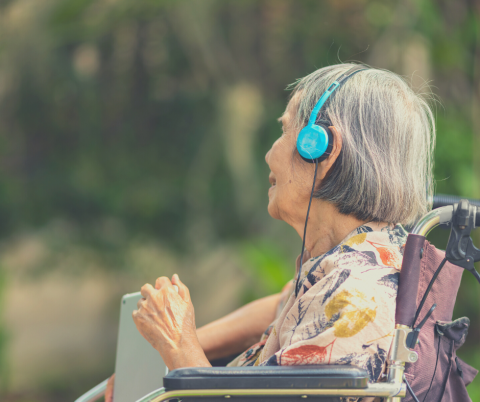Language, Music and Dementia (2023-2024)
Background
The question of how language and music are represented in the human brain is one of the more challenging problems of contemporary cognitive neuroscience and neurolinguistics. During the past two decades, advances in neuroimaging technology have produced a greater understanding of higher cognition, including language and music.
This project is unique in bringing together behavioral and neuroimaging research on language and music in both healthy subjects and patients with dementia. With recent studies showing that dementia affects approximately one in ten adults ages 65 and older in the United States — and over 55 million people worldwide — it is increasingly important to understand the correlation between language and music and how they correlate with reduced prevalence of this condition.
Project Description
This project represents an ongoing research partnership among Duke’s neuroscience, neurosurgery, linguistics and music experts. Building on the work of previous teams, this team will:
- Establish the language and music mappings in professional musicians who are either monolingual or multilingual.
- Examine the effect of musical training and multilingualism on dementia and cognitive impairment.
- Explore the short- and long-term effects of the COVID-19 pandemic on individuals involved in music and multilingualism in different communities and levels of interaction.
The project’s experimental design includes various forms of neuroimaging, such as fMRI, DTI and EEG, as well as behavioral data collection, including interviews, recordings and language proficiency testing. The project includes three Institutional Review Board (IRB) protocols fine-tuned to different aspects of the project goals: one focused on mono- and multilingualism; one on musicianship and creative expression; and one examining the interactions of the former two. Team members will interact across protocols and conduct important primary research in each of the pathways.
Anticipated Outputs
Imaging data elucidating how languages and musicianship are processed in the human brain; behavioral data establishing relationship between extensive musical training and possible advantageous effects on dementia symptoms; academic publications; conference and community presentations; future grant proposals
Student Opportunities
Ideally, this team will include 2 graduate and 10 undergraduate students. Undergraduates from disciplines such as neuroscience, linguistics and music as well as Duke medical students, residents and fellows will be strong candidates.
Students will be involved directly with data collection and analysis in all three above-mentioned IRB protocols, including fMRI, EEG and behavioral data collection concerning language and music with healthy subjects and with dementia patients. They will also be involved in the development of a new IRB protocol and efforts leading to publications and grant applications, and may have the opportunity to gain presentation experience.
This project includes an optional summer component in which about 10 students may work approximately 15 hours per week for one month.
In Fall 2023, the team will meet on Mondays from 3:00-4:30 p.m.
Timing
Summer 2023 – Spring 2024
- Summer 2023 (optional): Continue work on existing IRB protocols
- Fall 2023: Conduct behavioral and neuroimaging data collection with healthy musicians; examine potential impact of musicianship and multilingualism on building cognitive brain reserve; continue data analysis
- Spring 2024: Continue data collection and recruitment of subjects; conduct comparisons of resting state functional connectivity data between healthy adults and dementia patients; complete data analysis; prepare manuscript(s) for submission
Crediting
Academic credit available for fall and spring semesters; summer funding available
This Team in the News
Meet the Winners of the 2024 Bass Connections Student Research Awards
See earlier related team, Language, Music and Dementia (2022-2023).

Team Leaders
- Edna Andrews, Arts & Sciences-Slavic and Eurasian Studies;Program in Linguistics
- Andrew Michael, Duke Institute for Brain Sciences
- Daniel Sexton, School of Medicine–Dept of Neurosurgery
- Alexandria Swaine, Arts & Sciences-Program in Linguistics
/undergraduate Team Members
-
Carolyn Chen
-
Nina Zhang, Neuroscience (BS)
-
Amitesh Verma, Neuroscience (BS)
-
Jaeden Toy, Computer Science (BS)
-
Elizabeth Sayler
-
Yulia Savine
-
Anika Pawlak, Program II (BS)
-
Aline Malek, Neuroscience (BS)
-
Jing Liu, Interdepartmental Major
-
Sasha Faison, Philosophy (AB)
-
Amishi Desai, Neuroscience (BS)
-
Bryant Chung, Computer Science (BS)
-
Kayla Cao
/yfaculty/staff Team Members
-
Yana Lowry, Duke Focus Program
-
Todd Harshbarger, School of Medicine-Brain Imaging and Analysis Center
-
Gerald Grant, School of Medicine-Neurosurgery
/zcommunity Team Members
-
Eric Miller, Immaculata University
